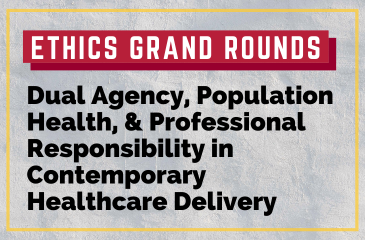COVID-19 may overwhelm our healthcare system. But healthcare professionals aren’t just stretched during a pandemic. The way healthcare is structured means every day they are torn, advocating for individual patients while juggling competing demands of a group of patients. They are responsible for healthcare systems and populations, not just individual patients. The way we talk about professional responsibility doesn’t always account for the anguishing challenges many healthcare professionals routinely face. In this Ethics Grand Rounds, we addressed this urgent public health crisis and discussed whether the ways we think and talk about professional responsibility reflect these complex challenges during a public health crisis and in routine patient care.
A traditional ethic of medicine asserts that physicians have special obligations to individual patients with whom they have a clinical relationship. Professionalism requires that physicians uphold patients' best interests while ensuring just use of health care resources. Yet contemporary trends in US healthcare financing, like bundled payments seem to threaten traditional conceptions of special obligations of individual physicians to individual patients; their population-based focus sets a tone emphasizing the responsibilities of physicians working within organizations to groups of patients served by those organizations. Likewise, while population health has the potential to improve patient care and health outcomes for individual patients, specific population health activities may not be in every patient's best interest in every circumstance. This can create ethical tensions for individual physicians and other healthcare professionals practicing within health systems with population health strategies.
Speaker(s)
Jon Tilburt, MD is a professor of medicine and biomedical ethics at Mayo Clinic where he has been on staff since 2007. He trained in philosophy, internal medicine, and health services research. He studies and writes about ethics and professionalism while conducting grant-funded research on communication and decision making in healthcare delivery. He’s inspired by a desire to recover and reinvent human connection in industrialized healthcare, striving to insure care is meaningful and fitting.
